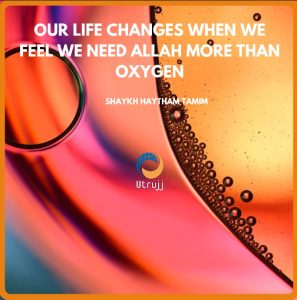(2:138) When Islam is like Oxygen in Your Life- the 7 benefits of dhikr

The Importance of Connecting with Allah
The Benefits of Dhikr
‘We dye ourselves with the colouring of Allah! For who is better in colouring than Allah? We are to worship none but Him.’ (2:138)
Allah Almighty has endowed us with fitrah so that we may recognise the Truth. The truth is like a dye, which soaks deep into fabric leaving a permanent stain. In this ayah, Allah Almighty talks about ‘sibghah’: a dye. Imaan comes to us like the dye that changes the colour of cloth; it changes the very fabric of our being.
Imaan should go deep into our character – permeating our hearts, thoughts and words. People talk about what they love – cooking, football, money, politics, fashion – similarly if we love Allah Almighty we should mention Him all the time. Our heart is a receiver; the more we remember Him the more our hearts are occupied with Him.
In Christianity, the act of baptism is called sibghah. It is the introduction of faith by pouring water over someone. Arab Christians used to add dye to the water they used for baptism to signify their new faith. In this ayah, Allah Almighty is reclaiming the concept of sibghah as an external dousing of faith, and re-orientating Christians back to Himself, asking them why they are arguing about the nature of Allah Almighty when He is the Lord of us all.
Polish your heart so it can connect
The Qur’an is telling us that it is not the physical act of baptism which brings faith to the heart, rather the connection of our heart with Allah Almighty through our fitrah and innate desire for imaan. The equipment to connect to Allah Almighty is present in our heart already. We need to strengthen this connection by polishing our hearts so we can see it inside ourselves and also in others. We cannot judge people by their exteriors.
Allah Almighty existed when nothing else existed. He created all mankind and commanded us all to remember His favours on us with gratitude.
‘Remember Me, and I will remember you, and be thankful to Me, and be not ungrateful to Me.’ (2:152).
The rest of creation worships Allah Almighty at all times, but it is only mankind that has the option to connect and disconnect with Him at will.
We can choose to be in a state of remembrance of Allah Almighty dhikr. When we are not in a state of remembrance, we start to ignore Him, or we become ghafil. May Allah Almighty protect us from this.
Allah Almighty does not receive benefit from our remembrance, nor can He be harmed by us not remembering Him. Remembering Him is a command for us, because it is in our best interests to stay connected to Him. Our Prophet (peace be on him) remembered Allah Almighty at all times and connected all things back to Him.
Here are 7 Benefits of Dhikr:
1. Remembrance gives us energy
Scans of cells have shown that cells become energised during salah. Remembering Allah Almighty should motivate us to do good deeds and inspire us to do what He loves us to do.
Verily, in the remembrance of Allah Almighty do hearts find rest. (13:28).
This deep rest is highly energising in all of our endeavours, spiritual or worldly. It puts barakah in our efforts, straightening out direction in life and carrying us forward with divine energy.
2. Remembrance provides protection
Dhikr also protects us against love of the dunya and succumbing to our shahawat – whims and desires. In the pursuit of these desires we move further away from Allah, as we forget Him through them, or we succumb to the whispering of Shaytan when we cannot attain them.
Dhikr reminds us that our goal is to keep connected with Allah, and it makes Shatyaan’s waswaas, or whispering, vanish. Though Shaytan exists, we have a shield against him; as he brings negative emotions such as anger, jealousy and depression, Allah Almighty brings tranquillity. When we experience difficulties, it is Shaytan who puts a spin on them, flooding us with despair, but Allah Almighty promises us hope.
We should especially think of Allah Almighty when times are good, because the Prophet (peace be on him) said
Remember Allah Almighty during times of ease and He will remember you during times of difficulty (Tirmidhi)
3. Remembrance elicits Allah Almighty’s attention
Allah Almighty is the ‘jalees’ of the one who remembers Him. In other words He is the confidante, or the one who sits closely with us giving us His full attention. Some company drags us down, but the people of Allah Almighty make us feel light and unburdened. So we should spend time with those who remind us of Allah Almighty not those who make us forget.
‘So remember Me, and I will remember you, and be thankful to Me, and be not ungrateful to Me.’ (2:152)
‘I am to my servant as he expects of Me, I am with him when he remembers Me. If he remembers Me in his heart, I remember him to Myself, and if he remembers me in an assembly, I mention him in an assembly better than his…’ (Bukhari and Muslim)
‘When a group of people assemble for the remembrance of Allah, the angels surround them (with their wings), (Allah’s) mercy envelops them, sakinah, (tranquillity) descends upon them and Allah Almighty makes a mention of them before those who are near Him.’(Muslim).
In gatherings, Allah Almighty tells us that if we remember Him, He remembers us to the angels. It is like a King mentioning us to an enormous gathering of the purest beings who are close to Him. What an honour!
4. Remembrance provides tranquility especially in salah
The Prophet (peace be on him) said to Bilal, ‘Call the adhan, so we can feel comfort’.
Salah is the highest form of dhikr. It is the pleasure of the heart and soul. In surah Jummua, Allah Almighty says:
Hasten for the remembrance of Allah. (62:9)
The words of the adhan urge us to ‘Hurry to prayer, hurry to success!’, as establishing prayer straightens our lives and is the means to success. Delaying salah is delaying success irrespective of our efforts, as Allah Almighty is the Creator of cause and effect and He has told us that by hurrying to salah, we will find success in our lives, not just in the akhirah.
5. Remembrance increases Ihsan
Dhikr brings ‘ihsan’ or excellence into our conduct. How? Because the answer to ‘What is the best deed?’ was ‘Keep your tongues moist with the remembrance of Allah’. Every word we utter reflects the state of our heart and colours our surroundings. Connecting to Allah Almighty makes us avoid sin and do what pleases Allah. The deeds that please Allah Almighty bring benefit to us and those around us.
6. Remembrance keeps the heart healthy
‘Indeed there is a piece of flesh in your body which, if it be sound, then the whole body will be sound and if it be corrupt then the whole body will be corrupt. Indeed it is the heart.’ (Bukhari).
The heart is like a mirror. If it is shining it lights up everything around it, if it is dark, it casts shadows around it.
7. Remembrance leads to our needs being fulfilled
We are in a state of need. As Musa (peace be on him) said in Surah Al Qasas ‘My Lord! Truly, I am in need of whatever good that You bestow on me!’ (28:24).
By remembering that the source of everything we have is Allah Almighty, we are acknowledging His gifts to us which in turn increases His favours. We are passed things from others but their origin is Allah Almighty. We forget this much of the time, even thinking that we have earned things by our efforts, but Allah Almighty reminds us:
‘Verily if you thank Me, I will grant you an increase (in My favours)’ (14:7)
‘If you were to count Allah’s favours, you would not be able to number them; most surely humanity is very unjust, very ungrateful.’ (14: 34)
Remembrance is an indication of shukr or gratitude. Mr Grumpy is not very connected to Allah.
How to Receive the Light of Allah
Being Strategic in Preparing for the Akhirah
The Importance of Dhikr – The Mindful Muslim
How can we use Fatiha to cure us?
The Du’as Allah is quick to answer
Recommended Posts

What dua can I make for righteous children?
April 10, 2023



